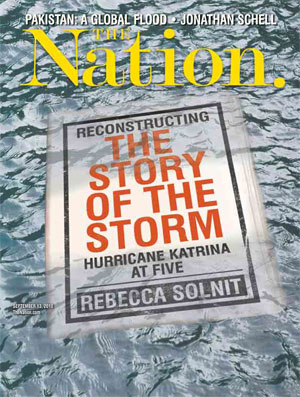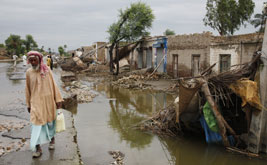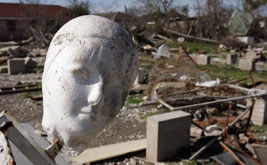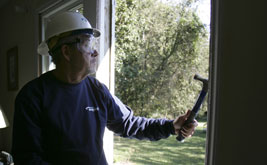Inequality—Connect the Dots...
Ames, Iowa I am surprised that your special issue "Inequality in America" [July 19/26] skirts the giant elephant in our midst: the obscene piece of the economic pie going to the military. Military spending is not a good way to create jobs or distribute wealth. As Eisenhower said, "Every gun that is made, every warship launched, every rocket fired signifies, in the final sense, a theft from those who hunger and are not fed, those who are cold and are not clothed."
DEBORAH FINK
Chicago
The various contributors to this special issue restate the argument The Nation has been making for months now: wealth to the top, loss of jobs, solution is Keynesian stimulation, etc.
One has to admire how Robert Reich manages to describe the past twenty years without stating the obvious: class war is being waged, and both parties have chosen to be on the same side. No, this not a win-win situation where all The Nation's contributors need to do is show Washington power brokers that green solutions will benefit their corporate sponsors. No, it is not a question of Obama having hired the wrong economic advisers because he didn't know Galbraith in Texas would love to serve. Hello! It is not a question of getting the truth out to the people with power.
I've been a union carpenter for thirty years. It is a depression out here. The local media say 40 percent of construction workers are unemployed. Of roughly 38,000 union carpenters, only 11,000 qualified for their health benefits last quarter. (You qualify if you worked 250 hours the previous quarter or 1,000 the previous year.) Whatever numbers you believe, and most of us don't believe the official statistics, a lot of people are hurting. When will you get outside the box that limits political and economic debate to the difference between Keynes and Hayek? And please, forget about trying to persuade the power brokers. This is a war. Why not join the counterattack?
MYRON PERLMAN
Harry Hangs the Laundry
Dixon, N.M.
In response to Katha Pollitt's "Women on Top?" [July 12], I would argue that having two parents/members of the household working full time spells disaster for the planet. The economic recession—conservation by default—has done more to decrease our carbon emissions than all the resource-consuming alternatives. As Americans, a lot of us pay to work, contributing to credit card debt, stress, bad food choices and climate change. Ecologically speaking, someone needs to stay home, but it shouldn't have to be the woman—this is where men still need to step up to the plate. Hanging up the laundry and forging a relationship with a local grower, then cooking that food with love and care—these are things that shouldn't be optional in our country. We should strive for more balance in work and home life for women and men. Better for us—and better for the planet.
FELICITY FONSECA
Troubled Oil on Water
Los Angeles
In "A Hole in the World" [July 12], Naomi Klein asserts that the main issue in the BP oil "spill" is "our culture's...claim to have...command over nature." This assessment shifts blame to a "culture" or a "them," when the real culprit is a world full of individuals, Klein included, who do not comprehend the consequences of their actions.
Control over nature is a philosophical issue that few people contemplate. More likely, people consider whether they would prefer to walk six miles to the store or drive. Most drive without considering any ramification beyond the loss of $3 to their preferred energy corporation. I think it is safe to assume that Klein drives a car and uses a computer. These are the issues surrounding this disaster—everyday people consuming everyday petroleum.
The gulf will not be made "right," and people will not cease, until they are forced to. The issue is not cultural philosophy but rampant irresponsibility by people (probably including you, dear reader).
JIAN NAJAC
Boston
Naomi Klein generalizes, even psychologizes, the BP disaster, suggesting that the problem is that we think we can manipulate nature. Who's "we"? Humans? Americans? Westerners? However imperfect or uninformed, most people don't seek to recklessly strip the earth of its resources without regard for the consequences: industries do that. And they don't act that way out of hubris; they do it to maximize profits within a frenzied capitalist system uninterested in human or nonhuman well-being. After all, there's no science to ignoring your own employees' warnings, haphazardly dumping toxic dispersants or obscuring better estimates of the leak rate. The problem is simpler, and much more vulgar.
CARL MARTIN
'Artsy-Fartsy Francophone' Flicks
Forest, Ill.
Emily Witt's June 7 "Imperfect Cinemas" is the closest thing I have read to what I experience as the "African identity." Witt gets the fact that those artsy-fartsy Francophone movies Westerners praise for being so "auteur" and "revolutionary" have no appeal to common members of African society. Your explorations, Mr. African Indie Film Director, of the deep-seated neocolonialism in the psyche of the "African" through your dripping faucet imagery may have been praised from Cannes to Sundance, but, I can assure you, your layman Ghanaian or Gambian isn't interested. We want to see someone's marriage being wrecked by an evil mother-in-law, the "big oga's" daughter finding out she's been impregnated by the ruffian from across the street or at least the bush villager finally getting his chance to chase the American Dream.
We may not be living up to Kwame Nkrumah's dreams of Africans maximizing their intellectual potential, but what society nowadays does? With America and Britain still in the throes of the "reality" TV revolution—ardently consuming such classics as Toddlers & Tiaras (ironically, on The Learning Channel) and the fist-pumping king of them all, Jersey Shore—we can hardly adjudicate these as intellectual prowess at its finest. When was the last time even I, a college-educated young woman, decided to skip my weekly serving of The Bachelor for a hearty helping of Masterpiece Theatre? I would say, never.
It's a sad situation we find ourselves in globally, but that's something we can agree on: it's a global phenomenon. What we do to stop this and who we blame is, of course, another matter. I simply stand to commend Witt on her ability to look past her own interpretations of what the African perspective should be to write about what Africans themselves have shaped as their viewpoint of the world.
WILHEMINA HAYFORD Read More
Our Readers









